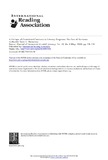A critique of centralized curricula in literacy programs: the case of Botswana

View/
Date
2002-05Author
Maruatona, T.L.
Publisher
JAAL, http://www.reading.orgType
Published ArticleMetadata
Show full item recordAbstract
In Botswana a centralized curriculum is characteristic of many government-sponsored literacy programs. It denotes concentration of decision-making authority at the top of the organizational hierarchy. Adult literacy, like other forms of education, has tendered to facilitate political control by the social and economic elite (Foley, 1999). The curriculum thus tends to represent the perspectives of the politically powerful, reflecting what Freire (1990) branded “Banking education.” Such an approach leads to teachers having a minimal influence on curriculum contents, choice of literacy text-books, and language (Apple,1993, Maruatona, 1994).
